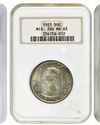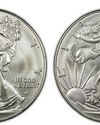
Semi-numismatic coins are literally and figuratively S worth a little more than their weight in gold (or silver, platinum or any other precious metal from which they are made). These coins have small collector premiums above the value that the coin would have if it were melted down for its metal value.
The spot price of gold, silver or other precious metals is the current price in the marketplace at which a given asset, such as one troy ounce of gold or silver, can be purchased or sold immediately "on the spot."
Premium over spot indicates what the markup is for a particular bullion item over the current price per troy ounce for that specific metal type.
There are a few different types of hybrid-value coins that are available for purchase. Each has a particular role to play in an investment portfolio and they differ from one another in such areas as value volatility, price premium and number manufactured.
BULLION COINS
Bullion coins have their values based solely on the spot price of the bullion or metal from which the coin was made. A premium is that portion of the price that the marketplace determines that coin is worth above that spot price. Premiums on bullion coins are typically razor thin, but every mint, whether a sovereign mint or a private mint, does charge a premium.
Remember, the United States Mint, and all sovereign mints, don't sell their bullion coins at the spot price. The U.S. Mint, like all other mints, has to buy the actual gold or silver planchets or metal disks on which to strike or manufacture the coins. The mints that strike the coins buy the metal, refine it (if needed), prepare the dies, market their products and pay their employees. All of that costs money, so mints charge a premium over the spot price in order for them to make a profit. In typical markets, these mints charge a premium of anywhere from 1.5% to 3.5% over spot on a one troy ounce gold coin.
Diese Geschichte stammt aus der October - November 2024-Ausgabe von COINage Magazine.
Starten Sie Ihre 7-tägige kostenlose Testversion von Magzter GOLD, um auf Tausende kuratierte Premium-Storys sowie über 8.000 Zeitschriften und Zeitungen zuzugreifen.
Bereits Abonnent ? Anmelden
Diese Geschichte stammt aus der October - November 2024-Ausgabe von COINage Magazine.
Starten Sie Ihre 7-tägige kostenlose Testversion von Magzter GOLD, um auf Tausende kuratierte Premium-Storys sowie über 8.000 Zeitschriften und Zeitungen zuzugreifen.
Bereits Abonnent? Anmelden

Top 6 Most Popular U.S. Commemorative Coins
During a half-century of researching U.S.commemorative coinage, I have found that these are the top six U.S. commemorative coins favored by collectors, dealers and investors.

GUIDE TO GRADING SILVER AMERICAN EAGLE ONE-OUNCE BULLION COINS
CAC'S MODERN COIN MINT STATE GRADING STANDARDS

TOP Jen U.S. Gold Coins
LIST OF STRONG PRICES AT SPECTACULAR AUCTIONS

$7,500 GOLD BY THE END OF THE DECADE?
\"Gold can easily triple by the end of 2030,\" declares Maurice H. Rosen, the prominent Plainview, New York, gold coin prognosticator and award-winning writer.

PCGS Coin Grading 101
In 1986, the numismatic world changed when Professional Coin Grading Service (PCGS) entered the scene as a third-party certification service to authenticate, grade and encapsulate coins at scale.

HOW TO USE THE COIN VALUES LIST
Coin values are provided beginning with small cents through Double Eagle gold pieces and beyond, and many of the popular modern coins in between, all based on The Insider's Guide to U.S. Coin Values, 21st Edition, by Scott A. Travers (www.usgoldexpert.com) and updated for accuracy.

THEINSIDER'S GUIDE TO U.S. COIN VALUES 23RD EDITION
ULTIMATE LIST OF COIN PRICES

Coin Dealers Attacked, Targets of Organized Crime
Coin dealers nationwide have become the latest victims of organized crime, facing targeted attacks following their attendance at coin shows.

Should You be Paying Sales Tax on Your Bullion and Coin Purchases?
THERE ARE MANY IMPORTANT EXCEPTIONS AND EXEMPTIONS

Physical Format Bitcoin Gains Collector Acceptance
PRICE RECORDS CONFIRM MARKET DEMAND